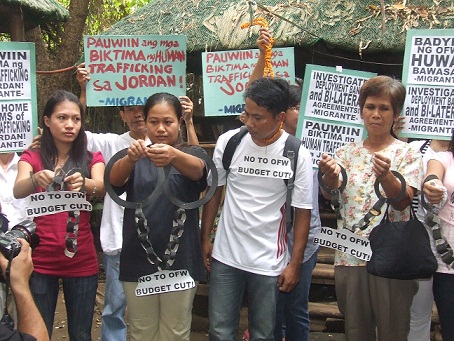
Considering that the government has intensified export of Filipino workers overseas because it cannot provide jobs for them, continuing to avoid going back in the Watch List is a consolation, however small because the ideal situation is that there should be jobs available for Filipinos in the country so that the father or mother, son or daughter does not need to be far away from his or her family in a strange environment just to earn a living.
In 2010, the Philippines was on Tier2 Watch List, countries which have the most number of human trafficking victims and with less government effort to stop all forms of human trafficking.
In 2011, the Philippines was removed from the Watch List and has maintained it this year.
Justice Secretary Leila de Lima takes the attitude of seeing the glass half-full:“Tier 2 is an important recognition of the country’s sustained and aggressive initiatives and programs to eliminate human trafficking. The Tier 2 status officially recognizes a country’s significant efforts to adhere to the benchmarks prescribed by the US State Department and meet the minimum standards.”
Sure, the State Department report took note that the Philippine government “demonstrated increased efforts to prevent human trafficking .”
The report noted that although the government does not fully comply with the minimum standards for the elimination of trafficking, “it is making significant efforts to do so.”
The report cited the increased funding of the Inter-Agency Council Against Trafficking (IACAT) from the equivalent of $230,000 in 2010 to the equivalent of $1.5 million in 2011.”
The top recommendations of the Global Trafficking in Persons Report for the Philippines are to sustain the intensified efforts to investigate, prosecute and convict an increased number of both labor and sex traficking offenders both locally & overseas and increased the funding for anti-trafficking programs.
That is a big problem for IACAT now because as noted in the report, through intense lobbying by Justice Undersecretary Jovy Salazar, who is in-charge of IACAT, budget was increased from P25 million in 2011 to P50 million in 2012.
For the 2013 budget, IACAT is asking for P100 million. Feedback from the Department of Budget is that IACAT will only be given P40 million.
It doesn’t make sense.
Other recommendations of the GTIP report are for the Philippines to address the significant backlog of trafficking cases by developing mechanisms to track and monitor the status of cases filed with the DOJ and the trial courts and to conduct immediate and rigorous investigation of complaints implicating government officials and ensure accountability for leaders that fail to address trafficking-related corruption within their areas of jurisdiction.
The report also said there is a need to strengthen anti-trafficking training and capacity building programs for law enforcers and expand the use of victim processing centers to additional areas in the Phils and allow for victims to be processed and assisted in safe environment after a rescue operation.
The report also saw the need to increase mechanisms and resources to assist trafficking victims.
For a more successful persecution of traffickers, the GTIP recommended increase in funding for DOJ programs for the protection of witnesses and entry of trafficking victims into the Witness Protection Program.
We are talking here of people whose remittances keep the whole Philippine economy going. They are hailed as the “modern-day heroes.” The government can give substance to that platitude by increasing funding for their protection.
The root of human trafficking in the country is poverty made more complex by the connivance of government officials.
Abroad, it’s heartbreaking to see Filipinos who are victims of human trafficking.
Traffickers should be punished the heaviest penalty.